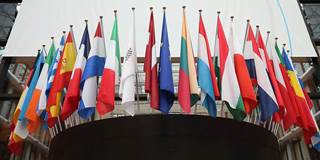If moderate forces in France and Germany fail to join together to create what the US historian Arthur Schlesinger, Jr., called the “vital center,” the assault on economic openness and liberal democracy will gain traction. In this sense, the French and German elections will turn 2017 into be a make-or-break year for the EU.
WASHINGTON, DC – In less than three weeks, we will know who will be the next president of the United States. What kind of partner that president finds in Europe will depend substantially on the outcome of two elections in 2017: France’s presidential election in early May and Germany’s federal election by the end of October.
Of course, the United Kingdom’s exit from the European Union will have an impact on the future shape of Europe. The “hard Brexit” option that has gotten a lot of attention lately – particularly since British Prime Minister Theresa May announced her intention to focus on limiting immigration, even if it means losing access to the single market – would by itself change the way Europe functions.
As French Prime Minister Manuel Valls recently wrote, the key question facing Europe’s leaders is whether to “give up and leave the European project to a slow but certain death” or to “transform the EU.” Such a transformation would be no easy feat. It would require not only a new institutional vision for Europe, but also a major political restructuring, not least in France and Germany.

WASHINGTON, DC – In less than three weeks, we will know who will be the next president of the United States. What kind of partner that president finds in Europe will depend substantially on the outcome of two elections in 2017: France’s presidential election in early May and Germany’s federal election by the end of October.
Of course, the United Kingdom’s exit from the European Union will have an impact on the future shape of Europe. The “hard Brexit” option that has gotten a lot of attention lately – particularly since British Prime Minister Theresa May announced her intention to focus on limiting immigration, even if it means losing access to the single market – would by itself change the way Europe functions.
As French Prime Minister Manuel Valls recently wrote, the key question facing Europe’s leaders is whether to “give up and leave the European project to a slow but certain death” or to “transform the EU.” Such a transformation would be no easy feat. It would require not only a new institutional vision for Europe, but also a major political restructuring, not least in France and Germany.